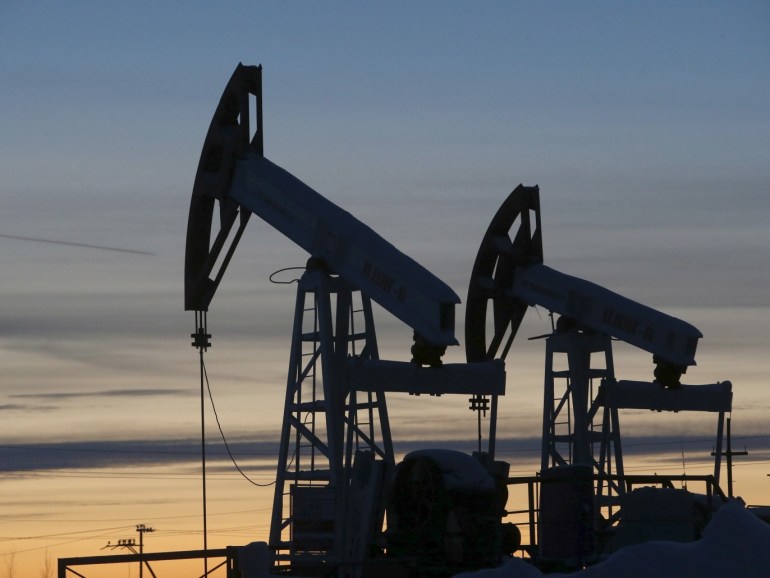A German news agency report said that 2020 may be the beginning of the end of the oil boom, and that the Gulf states may not be able to wait, given fears of declining revenues.
As the first giant in the sector, the British Petroleum Group (BP) announced in September that the era of increased oil demand was over, expecting that consumption may never reach a level before the start of the Corona crisis.
The World Bank wrote in its forecast for the raw materials market last October that the pandemic could have "lasting effects" on demand.
The sector has been discussing scenarios since the 1950s in the so-called "peak oil" theory - the point in time at which global oil production reaches its peak - and after that things continue to decline, according to that theory.
Meanwhile, the debate is no longer about depleted reserves and production caps, but rather about someday falling demand.
The International Monetary Fund predicted last February - that is, before Corona - that this point would be reached in 2040 "or much earlier", and it also did not rule out a "strong and continuous downward trend" in demand, attributing that also to the slowdown in population growth in The world, according to the German news agency report.
In addition to tougher climate protection laws and increased taxes on carbon dioxide emissions, with the 2015 Paris Agreement on Climate Protection, pressure increased on countries to buy and burn less oil.
In Germany, for example, the installation of oil-fired heating systems will only be permitted in exceptional cases from 2026. The German market for electric cars is also growing thanks to the popular incentives for buying electric cars.
However, the United States and China are by far the largest oil consumers.
Those who expect to increase oil prices in the next 15 years are increasing, including OPEC estimates (Reuters)
Critics of the "peak oil" theory
On the other hand, critics of the "peak oil" theory argue that forecasts in the oil market have often been far from reality.
In any case, it is not possible to provide reliable forecasts on the movement of land and air transport, as well as on work from home after the end of the Corona crisis, but the list of analysts who expect oil prices to rise in the next 15 years is increasing, according to a report issued by Bloomberg News. Economic.
These include Norwegian oil company Equinor, which expects to rise by 2027 and 2028, France's Total Group (TOTAL) (by 2030), and management consulting firm McKinsey (by 2033).
The Organization of the Petroleum Exporting Countries (OPEC) talks about a rise in oil prices by 2040.
Warnings
Until then, the Gulf states - which produce a fifth of global oil production - do not want or cannot wait, as the German News Agency reports.
The International Monetary Fund warns that these countries could deplete their assets within 15 years if the development was negative, and the Fund speaks of a "big challenge" with regard to the budgets of these countries.
For the sparsely populated Gulf states, such as Kuwait, Qatar and the United Arab Emirates, the threat appears to have less of an existential impact, but it may be more difficult for Oman and Bahrain, with their smaller oil reserves.
And also to Saudi Arabia - the world's number one oil exporter - where 34 million people live.
Saudi Arabia - where oil accounts for nearly 70% of state revenues - is proceeding with economic restructuring, according to the "Al Germania" report.
Russia is still dependent on dollar revenues for oil by nearly 30% (Reuters)
Russia and Venezuela
And in Russia - a superpower in the field of raw materials and the second largest oil exporter after the Kingdom of Saudi Arabia - the state budget is still dependent on oil dollar revenues by about 30%.
Russian President Vladimir Putin says that his country has begun to get rid of the "thorn" of the oil and gas trade.
So there is no longer any reason to discredit Russia as a "gas pump".
However, dependence on raw material income remains high, the report continues.
The current budget in Russia is based on an oil price of about $ 42 a barrel.
If this value falls - as it did this year - income will decrease.
Russia has lost billions as a result of reduced demand and reduced production.
This has exacerbated the economic crisis that began before the Corona pandemic.
During the period from January to last September, revenues from oil and gas sales decreased by 35.9%, compared to the same period of the previous year, according to data from the Moscow Accountability Authority.
As for Venezuela - one of the countries with the largest oil reserves - it gets 95% of its foreign exchange from oil exports.
Due to mismanagement and strict sanctions from the United States, among other things, oil extraction and processing has almost stopped.
The report concludes that Venezuela today suffers from power cuts, long queues in front of petrol stations and protests against the lack of supplies, and Venezuela's economy may also threaten to collapse if the "peak of oil" is reached.

